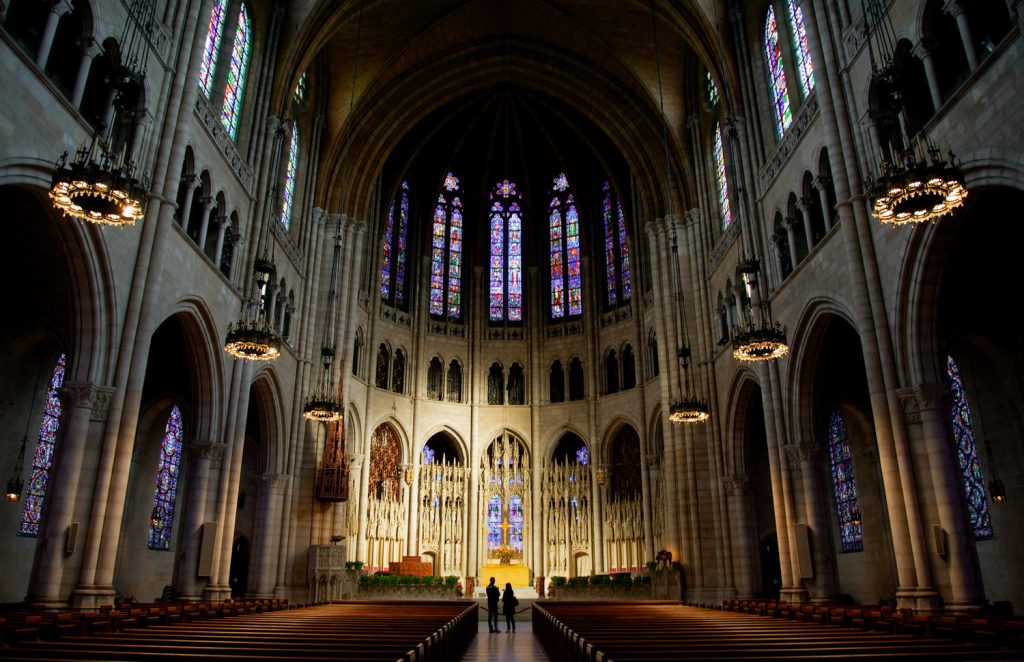With another new year around the corner, I’ve been considering a koan from The Gateless Barrier, a collection of verses and stories compiled by Master Yunmen, a 9th century Zen master:
Ummon said, “See how vast and wide the world is! Why do you put on your robes at the sound of the bell?”
Bells have long been part of my New Year’s tradition. Every New Year’s Eve, I attend the Watch Night service at New York City’s Riverside Church. This church, located in Harlem, houses a seventy-four-bell carillon. It is the world’s largest carillon by weight, and its Bourdon Bell, which weighs 40,000 pounds, is the largest tuned bell in the world.
These bells play an important role in the church’s Watch Night service. Every year, hundreds of people gather to worship and contemplate poignant sermons focused on compassion, faith, and social justice. After the service ends, the parishioners sit in silence together until midnight. At that time, the church’s renowned bells ring out, marking this distinct shift from one year to the next.
In the United States, Watch Night services have a deep historic significance. These services remember the transition from December 31, 1862 to January 1, 1863, which is the moment Abraham Lincoln’s Emancipation Proclamation took effect and legally freed enslaved African Americans. Watch Night services also acknowledge that slavery, racism, and oppression are ongoing realities in our world, and inspire action toward collective freedom.
The sound of Riverside Church’s powerful bells offers me a profound moment of awareness. When I first hear the bells, I sit up tall and open my eyes. As the bells continue to ring, the vibrations from their enormous sound move down through the walls of the church, into the pews, and vibrate in my body. I hear the bells, and I also feel them ringing within me. In these moments I feel alert, present, and calm.
In many Buddhist traditions, ringing bells not only capture people’s attention, but also remind them of the power of compassion as well as the potential for liberation. In Japan, Buddhist communities gather on New Years Eve for Joya no kane, a traditional bell-ringing ceremony. Monks ring bells 108 times, marking each of the 108 kleshas, or defilements, with aspirations to eventually transcend them. At the Plum Village Monastery in France, devotees of Thich Nhat Hanh come together every morning to sing The Great Bell Chant. This chant, intended to evoke attentiveness, reminds listeners that the sound of a bell can awaken them from states of forgetfulness and complacency.
In Tibetan Buddhism, bells are among the most sacred of ritual objects. The bell, which symbolizes wisdom, is often paired with a vajra, which symbolizes compassion. Together, wisdom and compassion embody a union of dualities. Attaining both wisdom and compassion would help liberate a devotee from samsara, the cycle of death and rebirth, and achieve enlightenment.
In poetry, meanwhile, many references to bells symbolize a call to attention that results in some kind of inner transformation. In one 18th-century haiku, Japanese Zen poet Yosa Buson hints at a bell’s latent power to ring and awaken:
Clinging to the bell,
he dozes so peacefully,
this new butterfly
Other poems describe the lasting effects of a bell long after it has stopped ringing. In the following haiku, Japanese Zen poet Matsuo Basho describes how the sound of a bell can instill a deep echo that radiates from within:
The temple bell stops—
but the sound keeps coming
out of the flowers
Other texts capture the ways in which a bell sound can reflect a larger, more collective transition. I’ve long admired the 19th century poem “In Memoriam, [Ring out, wild bells],” by Alfred, Lord Tennyson. In this poem, the sound of bells on New Year’s Eve encourages us to honor death and practice letting go:
“Ring out, wild bells, to the wild sky,
The flying cloud, the frosty light:
The year is dying in the night;
Ring out, wild bells, and let him die.Ring out the old, ring in the new,
Ring, happy bells, across the snow:
The year is going, let him go;
Ring out the false, ring in the true.”
Each time I revisit Master Yunmen’s koan, I wonder: What do I do when I hear a bell, and why do I do it? I also question how often I am motivated by external influences, like the sound of a bell, and which of my actions stem from a deeper internal desire. I do know that the latter feels more freeing.
When I first hear the grand bells at Riverside Church, my desire to connect with people seems to rise from within. I want to feel seen, and I want others to know that I see them. I want people to know that I long for the same things they do. I want us all to feel a sense of comfort and peace.
As those wild bells ring out, I reach for the hand of the person next to me, smile, and wish them a Happy New Year.
Thank you for subscribing to Tricycle! As a nonprofit, we depend on readers like you to keep Buddhist teachings and practices widely available.
